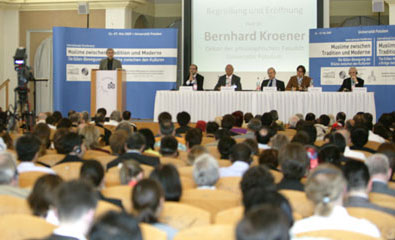Post-Potsdam Conference Reflections
 Even as Turkey debates its track record on the treatment of minorities and opens the discussion about the merits and demerits of integration versus assimilation, minorities in European countries too are experiencing growing hostility and violence from xenophobic elements, as we have seen, for example, in orchestrated physical attacks on the Muslim community in the UK this week.
Even as Turkey debates its track record on the treatment of minorities and opens the discussion about the merits and demerits of integration versus assimilation, minorities in European countries too are experiencing growing hostility and violence from xenophobic elements, as we have seen, for example, in orchestrated physical attacks on the Muslim community in the UK this week.
Radicalism, security risks and shrinking job prospects are not the only problems wrecking modern European communities. Failing families, inadequate educational performance and the real plague of substance abuse and associated crime are also among the major factors that lead to social marginalization and moral decay. Changing attitudes toward multiculturalism at the governmental level have also contributed to violent confrontations between racist elements and ethnic or religious minority communities in Europe.
This increasing radicalism and the ensuing security risks in some European countries have turned people of common sense to seek viable civic projects that contribute to social integration. This concern is reflected in the mission statement of the international conference titled "Muslims between Tradition and Modernity ― The Gülen Movement as a Bridge between Cultures."
"The peaceful coexistence of cultures, religions and human beings, especially between Muslims and non-Muslims, benefits all society and every individual. Too little has been done in recent history to take action and put this principle into practice. As early as the 18th century, Goethe knew that the East and the West were inseparable. However, today's society has not been able to fulfill Goethe's dream. Societies remain trapped in prejudices and stereotypes that strengthen the view of a separate East and West. European enlargement has made this even more pronounced and overwhelming."
At the conference, organized at the University of Potsdam by four academic institutes, 15 academics presented papers and remarks. Some papers focused on local or global issues, and the rest dealt with the service-projects organized by Gülen movement participants. The papers by Professor Simon Robinson, Dr. Rainer Hermann and Dr. Klas Grinell were particularly interesting to me. Their reports on their research bring to the fore how the participants in the Gülen movement aim to be beneficial to others, and how their service to others prioritizes knowledge and education rather than partisanship. This rejection of partisanship works against the kind of alienation between groups that produces the xenophobic aggression we have been seeing all too frequently in Europe lately. It also helps to reduce the discrimination against minorities that is now being openly admitted and analyzed in Turkey.
But a careful reading of these papers reveals that Gülen movement participants do not claim overnight transformations in structural, local or global issues. Whether the problems arise from local-systemic inefficiencies or global issues, the movement participants strive to offer workable solutions. Speakers gave examples of the movement developing effective approaches, for example, in Austria, Germany, the Netherlands, Turkey, Georgia and Australia.
The Gülen movement is a faith-inspired civic initiative. The basic principles of its service ethic come from Islam's universal values, but faith, religious consciousness and commitment do not make movement participants radical, fundamentalist or sectarian. Whether working in local ethnic minority communities in Europe or in larger institutions and transnational activities, the Gülen movement enables people to make better use of their resources, to free themselves from material and other inequalities and to become beneficial to others. Researchers maintain that movement participants respect different faiths and culture and also expect others to do so. This makes the Gülen movement pluralist and integrative.
One of the conference papers makes the point that movement participants do not only teach evolutionary Darwinism but give equal priority to creationist interpretations, but its conclusion is cautiously optimistic. Another notes that Gülen teaches, for a better future, that humanity needs individuals with genuinely open minds that respect freedom of thought and are open to science and scientific research.
The European researchers do not see the movement's participants as a "protest" movement looking to alter or overturn existing structures or policies, whether political or economic. On the contrary, participants work within the boundaries of laws and public norms wherever they have set up institutions.
So, participants in the Gülen movement are addressing and tackling the problems of modern communities. As a civil society movement, they are helping to find solutions at the level of the individual. They bring grassroots and bottom-up approaches rather than coercive and top-down. Such solutions can prepare the peaceful development and healthy integration of the individual into the contemporary era. There exist real cures for inter-communal violence, alienation and xenophobia.
- Created on .